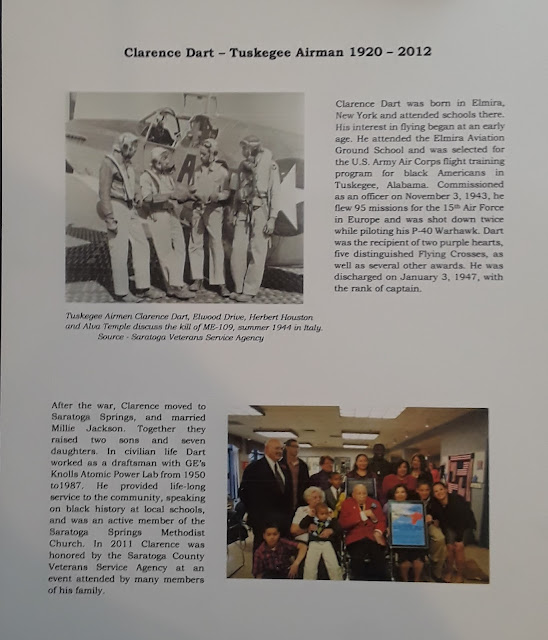The Tuskegee Airmen obviously didn't fight in the Civil War, but the U.S. armed forces were still segregated when Clarence Dart served in the 1940s. His extraordinary war record and subsequent life are described briefly above, in a display from a current exhibit at Brookside Museum in Ballston Spa, NY, called "Black Experiences in Saratoga County 1750-1950".
That life, as you can see, extended well after 1950, including a long and fruitful marriage, and service to causes such as the Charlton School for Girls, the Salvation Army and the Methodist Church.
Lieutenant Colonel Dart was duly (if belatedly) recognized by museums, media and elected officials from the state Senate to Presidents George W. Bush and Barack Obama.
But little is known about the vast majority of African-American troops in the Civil War who were led by officers such as James Montgomery, Gordon Granger and U.S. Grant. (That last link goes to a novel about Grant's last months, partly set in Saratoga County, which Brookside currently has for sale. Brookside is also sponsoring an April 6 Zoom program with Ben Kemp portraying Grant's eldest son Fred.)
The new federal holiday of Juneteenth comes from Granger's order of June 19, 1865 in Texas, proclaiming Emancipation and, in his words, "an absolute equality of personal rights and rights of property between former masters and slaves". Unlike Montgomery, Granger had not been an early abolitionist. President Grant, by the end of his second term, was not able to secure Reconstruction as a permanent guarantee of the equal rights which had been pledged. But the freed slaves, most of them illiterate, and their descendants held to an accurate understanding of this history. As a result, spurred by nonviolent Black leadership of the mid-20th century civil rights movement, the promise of Juneteenth was largely fulfilled.

.jpg)



